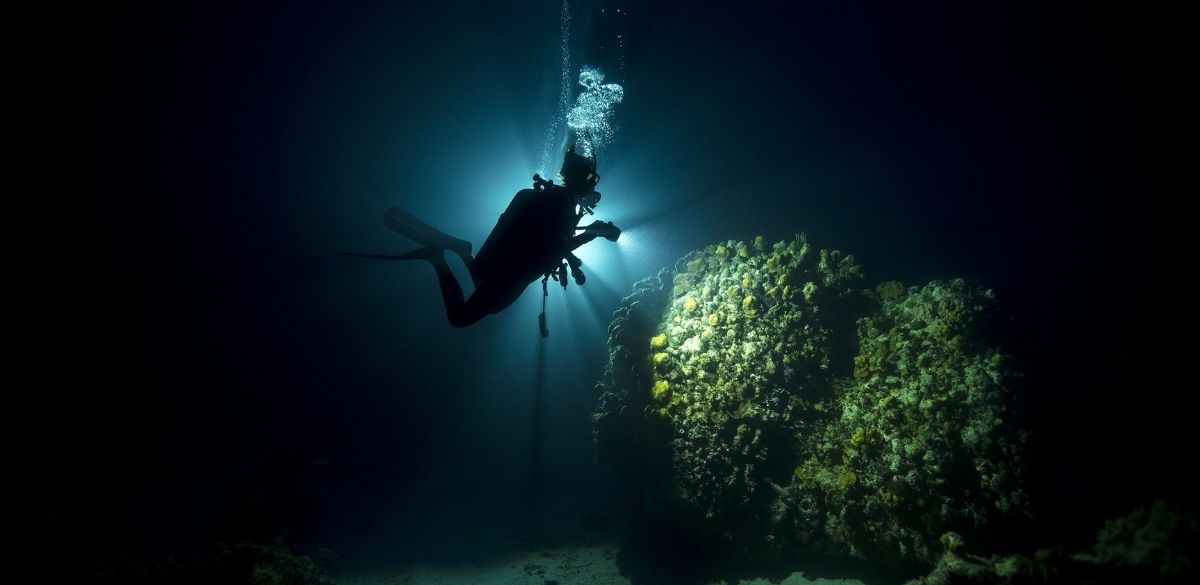Noctourism is on the rise. Not familiar with the term? It’s a growing travel trend focused on discovering unique, transformative experiences that happen after the sun sets. Whether it’s escaping the crowds, seeking something novel or tapping into the quiet magic of the nighttime, more travellers are turning to the dark hours for adventure and the ocean is no exception.
If you’re looking to step off the beaten path and explore a new dimension of the underwater world, night diving might be your next unforgettable experience.
Though it may sound extreme or exotic, night diving is surprisingly accessible. PADI Dive Centres around the world offer guided night dives, and in most cases, all you need is your PADI Open Water Diver certification to take part.
Although you may have been scuba diving at a site many times before, at night you drop into a whole new world and watch it come to life under the glow of your dive light. The scene changes as day creatures retire and nocturnal organisms emerge.
During the day, bright and colourful fish flock to the reefs, feeding and cleaning. Rays and sharks bask in the warm sunlight, and animals play in the shallows. At night, all these creatures go to sleep, and a whole new set of creatures emerges. You will see sleeping fish and creatures, as well as bioluminescent organisms making their way through the water. Certain animals give off eerie glows, which can be seen from far away.
Safety is of the utmost importance during a night dive. So, if you’ve ever wondered what happens underwater after the sun goes down be fully prepared and sign up for the PADI Night Diver specialty course
Eric Albinsson, Instructor Development and Training Executive, PADI who helped write the PADI Night Diver Certification Course tells us:
“You truly feel like you are experiencing inner space when night diving, with the chance to witness the glow-in-the-dark nocturnal marine world. It is normal for divers doing night diving for the first time to feel nervous, but many find it to be an extremely peaceful and meditative experience – and you’ll never get a better sleep than after this incredible diving experience.”
We dive in with PADI to discover some night dives to add to your bucket list!
Hawaii – Pelagic Magic Night Dive in Kona – where your night dive will have you drifting through the glow in the dark ocean (one of the most epic yet undiscovered night dives in the world). You can also get your PADI Pelagic Magic Specialty Course there.
Coral spawning, Curacao
You can witness the annual coral spawning event at a dive site known as Mushroom Forest. Occurring a few days after the full moon, an underwater fireworks show takes place as new reefs are formed – something certified divers can witness at night.
Fluorodiving
Fluorescent diving is a relatively new concept in the world of scuba. Using UV lights and mask filters, scuba divers light up coral reefs under the dark of night. The result is an underwater party. Shrimps, eels and all manner of marine life reflect the UV rays in brilliant pinks, purples and greens. Bonaire is on the cutting edge of this technology and one of the pioneering locations for its use. If you don’t happen to be in the Caribbean, you can also try this type of diving in Indonesia, Thailand and the Maldives.
Bioluminescent Bay, Cayman Islands
Seemingly otherworldly, glittering bioluminescent particles gather together in fantastic light displays on the Cayman Islands. Kayaking is particularly popular here, as the water is fairly shallow, and easily seen from above. Swimming, snorkelling, and diving is available as well.
Because of the fragility of these organisms, it is highly recommended not to wear sunscreens or lotions during your trip, as the chemicals can harm them.
Cancun, Mexico
Shining your dive light on the reefs off the coast of Cancun transforms them from blue tinted to vibrant colours at night. Neon pinks, oranges and yellows are brought out by the artificial light. After the incredible variety of creatures makes its bed for the night, a new, unusual bunch emerges. Bring your underwater camera, as you can still capture images of these weird animals.




























0 Comments